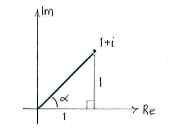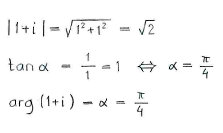Lösung 3.3:1a
Aus Online Mathematik Brückenkurs 2
(Unterschied zwischen Versionen)
| (Der Versionsvergleich bezieht 5 dazwischen liegende Versionen mit ein.) | |||
| Zeile 1: | Zeile 1: | ||
| - | + | In Polarform haben wir den Moivreschen Satz | |
| + | {{Abgesetzte Formel||<math>\bigl(r(\cos\alpha + i\sin\alpha)\bigr)^n = r^n(\cos n\alpha + i\sin n\alpha)\,\textrm{.}</math>}} | ||
| - | <math> | + | Also bringen wir <math>1+i</math> in Polarform, verwenden den Moivreschen Satz und schreiben die Potenz zuletzt wieder in der Form <math>a+ib</math>. |
| + | <center>[[Image:3_3_1_a1.gif]] [[Image:3_3_1_a_text.gif]]</center> | ||
| - | + | Durch die Rechnungen oben sehen wir, dass | |
| - | + | {{Abgesetzte Formel||<math>1+i = \sqrt{2}\Bigl(\cos\frac{\pi}{4} + i\sin\frac{\pi}{4} \Bigr)\,\textrm{.}</math>}} | |
| - | <math>\ | + | |
| - | + | ||
| - | + | ||
| - | + | ||
| - | + | ||
| + | Und durch den Moivreschen Satz erhalten wir | ||
| - | + | {{Abgesetzte Formel||<math>\begin{align} | |
| - | + | (1+i)^{12} | |
| - | + | &= \bigl(\sqrt{2}\,\bigr)^{12}\Bigl(\cos \Bigl(12\cdot\frac{\pi}{4}\Bigr) + i\sin \Bigl(12\cdot\frac{\pi}{4}\Bigr)\Bigr)\\[5pt] | |
| - | + | &= 2^{(1/2)\cdot 12}\Bigl(\cos 3\pi + i\sin 3\pi\Bigr)\\[5pt] | |
| - | + | &= 2^6(-1+i\cdot 0)\\[5pt] | |
| - | + | &= 64\cdot (-1)\\[5pt] | |
| - | + | &= -64\,\textrm{.} | |
| - | + | \end{align}</math>}} | |
| - | + | ||
| - | + | ||
| - | + | ||
| - | + | ||
| - | + | ||
| - | <math>\begin{align} | + | |
| - | + | ||
| - | & =2^{ | + | |
| - | & =2^ | + | |
| - | & | + | |
| - | \end{align}</math> | + | |
Aktuelle Version
In Polarform haben wir den Moivreschen Satz
| \displaystyle \bigl(r(\cos\alpha + i\sin\alpha)\bigr)^n = r^n(\cos n\alpha + i\sin n\alpha)\,\textrm{.} |
Also bringen wir \displaystyle 1+i in Polarform, verwenden den Moivreschen Satz und schreiben die Potenz zuletzt wieder in der Form \displaystyle a+ib.


Durch die Rechnungen oben sehen wir, dass
| \displaystyle 1+i = \sqrt{2}\Bigl(\cos\frac{\pi}{4} + i\sin\frac{\pi}{4} \Bigr)\,\textrm{.} |
Und durch den Moivreschen Satz erhalten wir
| \displaystyle \begin{align}
(1+i)^{12} &= \bigl(\sqrt{2}\,\bigr)^{12}\Bigl(\cos \Bigl(12\cdot\frac{\pi}{4}\Bigr) + i\sin \Bigl(12\cdot\frac{\pi}{4}\Bigr)\Bigr)\\[5pt] &= 2^{(1/2)\cdot 12}\Bigl(\cos 3\pi + i\sin 3\pi\Bigr)\\[5pt] &= 2^6(-1+i\cdot 0)\\[5pt] &= 64\cdot (-1)\\[5pt] &= -64\,\textrm{.} \end{align} |
